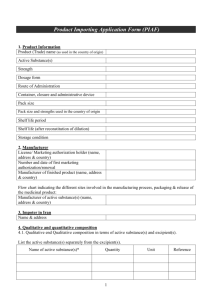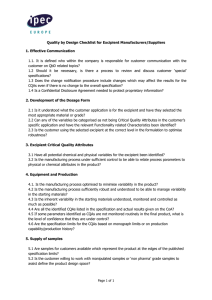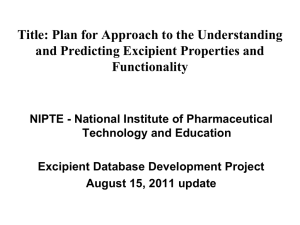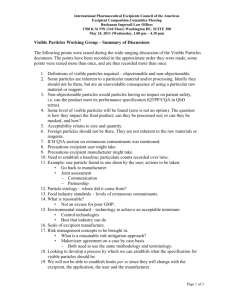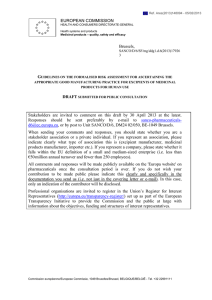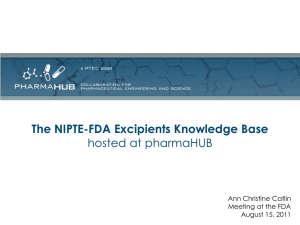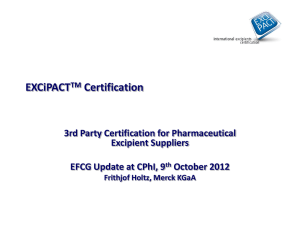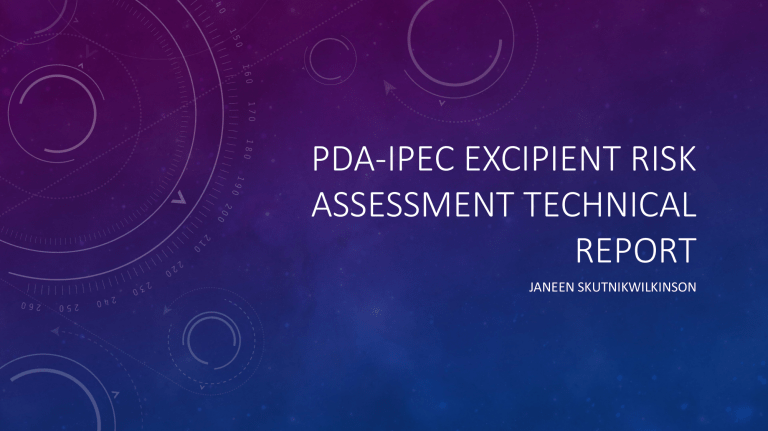
PDA-IPEC EXCIPIENT RISK ASSESSMENT TECHNICAL REPORT JANEEN SKUTNIKWILKINSON RATIONALE “Both PDA and IPEC Federation believe that presenting a common approach to the legal, regulatory, and related issues concerning excipients is best done as “one voice.” “…the document will enable Manufacturing Authorization Holders of drug product to either set up or benchmark their quality systems, and further establish or continue to collaborate with parties in their excipient supply chain” 3.0 OVERALL STRATEGY: HOLISTIC VIEW Potential hazards: the excipient itself & the supply chain Risk ranking and filtering: overall risk of harm to the drug product and patient safety Manufacturing authorization holder & excipient suppliers should work together Complete supply chain profile must be considered for each excipient Actions resulting from the risk assessment discussed and agreed upon between the excipient supplier and the manufacturer of the drug product Actions should be documented in a quality agreement or other document A global risk assessment of all excipients used will ensure a standardized assessment of all excipients in all drug products and provide a holistic view of the supply chain Single (worst case) risk assessment basis for agreement with the excipient supplier 4 DRIVERS FOR RISK ASSESSMENT AND REASSESSMENT Those drivers may include: • product deviations • market recalls • changes in excipient use • supply chain amendments • adverse trends in quality The manufacturing authorization holder is responsible for providing evidence that the risk management approach adopted is commensurate with the level of risk to ensure the safety, purity and other quality characteristics of the excipient in use. SUPPLY CHAIN COMPLEXITY • Pharmaceutical manufacturer needs to account for the complexity of the supply chain • Direct from manufacturer • Supply via distributor • Supply via repackager • Supply via broker • International Manufacturer exporting directly to user • The considerations vary according to source and knowledge ROLES IN SUPPLY CHAIN AND INFORMATION Meetings with manufacturers and suppliers Obligations placed in quality agreements or equivalent documents WHERE DOES INFORMATION COME FROM? Chemistry, manufacturing and controls (CMC) documentation Excipient manufacturer customer portals Internet Manufacturing authorization holder supply chain management and quality oversight functions Health Authority portals Quality and technical collaborations between excipient manufacturer and end user 6.0 A MODEL FOR QUALITY RISK MANAGEMENT FOR EXCIPIENTS The proposed QRM model for excipients is based on the risk ranking and filtering method Risk ranking and filtering is a tool for comparing and ordering risks Risk ranking of complex systems typically involves evaluation of multiple diverse quantitative and qualitative factors for each risk Intrinsic excipient risks and the supply chain risks These factors are combined into a single relative risk score that can then be used for ranking risks Filters, in the form of weighting factors or cut-offs for risk scores, are used to support risk acceptance or mitigation 10 RISK ASSESSMENT TEAMS: BROAD REPRESENTATION QRM Experts QA QC Quality QP Material sciences Regulatory Affairs Technical/operations Sterility assurance Auditng Procurement Outsourcing operations R&D Legal Engineering Medical/clinical Satefy / toxicology TABLE 6.3.2-1 EXCIPIENT RISK CALCULATION TOOL Risk Factor Excipient (RF E) LOW (1) MEDIUM (3) HIGH (5) RF E1: Functionality of Excipient in Formulation1 Diluent, coloring agent flavor, sweetening agent, identity through printing with ink, emollient, tonicity agent Thickener, coating agent, former, compression aid, lubricant, glidant and/or anticaking agent, humectant, suspending/dispersing agent, buffer, adhesive, penetrant, disintegrant, binder, capsule shell, plasticizers, pH modifiers, chelating and/or complexing agents, antioxidants, suppository base, suspending and/or viscosity-increasing agent, stiffening agent, propellant Antimicrobial preservative, vehicle, release modifier, wetting and/or solubilizing agent, pH modifier, pharmaceutical water RF E2: Intended Patient Intake (Consider dose regimen, frequency of dose, amount of excipient in dose form); consult the Inactive Ingredients Database (19) Expected maximum daily intake does not exceed known maximum dose of excipient in a drug product Expected maximum daily intake exceeds known maximum dose of excipient in a drug product RF E3:… 15 TABLE 6.3.2-1 EXCIPIENT RISK CALCULATION TOOL Each selection will result in a value of 1 (LOW), 3 (MEDIUM), or 5 (HIGH) for risk. The risk score for the excipient (ERPN) is calculated as the sum of the risk scores for each of the seven identified risk factors (RF E), divided by the number of risk factors. The resulting ERPN will be in the range of 1 (Low) to 5 (High). 𝑶𝑶𝑶𝑶𝑶𝑶𝑶𝑶𝑶𝑶𝑶𝑶𝑶𝑶 𝑬𝑬𝑬𝑬𝑬𝑬𝑬𝑬𝑬𝑬𝑬𝑬𝑬𝑬𝑬𝑬𝑬𝑬 𝑹𝑹𝑹𝑹𝑹𝑹𝑹𝑹 𝑺𝑺𝑺𝑺𝑺𝑺𝑺𝑺𝑺𝑺 (𝑬𝑬𝑹𝑹𝑹𝑹𝑹𝑹 ) = 𝑹𝑹𝑹𝑹 𝑬𝑬𝟏𝟏 + 𝑹𝑹𝑹𝑹 𝑬𝑬𝟐𝟐 + 𝑹𝑹𝑹𝑹 𝑬𝑬𝟑𝟑 + 𝑹𝑹𝑹𝑹 𝑬𝑬𝟒𝟒 + 𝑹𝑹𝑹𝑹 𝑬𝑬𝟓𝟓 + 𝑹𝑹𝑹𝑹 𝑬𝑬𝟔𝟔 + 𝑹𝑹𝑹𝑹 𝑬𝑬𝟕𝟕 𝟕𝟕 The resulting risk score (ERPN), along with a similar overall score for the supply chain, will be used to evaluate the suitability and acceptability of the current excipient setup. 16 • At a minimum, the following risk factors related to the supply chain (RF S) should be considered: • Supply chain complexity—supplier, broker, manufacturer relationships, opportunity for fraud (See Section 4.1.) • Prior knowledge of the supply chain— capability • Organizational volatility • Excipient manufacturer performance history—oversight knowledge such as customer complaints, changes, audits, trustworthiness, tailgate samples • Packaging suitability—ability to protect excipient from fraud, moisture, heat, and similar elements • QMS standard and certification TABLE 6.4-1 SUPPLY CHAIN RISK CALCULATION TOOL Risk Factor Supply Chain (RF S) RF S1: Supply Chain Complexity (Consider supplier, broker, manufacturer relationships, considering the opportunity for fraud) LOW (1) Purchased directly from manufacturer– low probability of fraud; sourced from a region with known and transparent controls on counterfeiting and security (i.e., US, EU); excipient not repackaged or manipulated after manufacturing process; transport from supplier is through qualified carrier MEDIUM (3) A least one broker, distributor, or intermediate supplier, but there is transparency to the original manufacturer and location; supplier re-manipulates (i.e., repackages, relabels) under established and understood GMP procedures HIGH (5) Supply chain is complex with several manipulations or distribution channels; repackaging and/or manipulation occurs after the manufacturing process; region of security concern and potential for fraud RF S2: Prior Knowledge of the Manufacturer (Consider capability) Prior experience with manufacturer; critical attributes monitored and controlled; no excipient nonconformance, rejections, or complaints; no evidence of variability in final drug product attributes related to excipient Minimal experience with manufacturer, and/or minor delivery issues No experience with manufacturer, or manufacturer has a history of delivery issues; evidence of excipient variability; previous or outstanding complaints and impact on final product attributes RF S3:… 18 SUPPLY CHAIN RISK CALCULATION TOOL Each selection will result in a value of 1 (LOW), 3 (MEDIUM), or 5 (HIGH) for risk. The risk score for the supply chain is calculated as the sum of the risk scores for each of the six identified risk factors (RF S), divided by the number of risk factors. The resulting ERPN will be in the range of 1 (Low) to 5 (High). 𝑹𝑹𝑹𝑹 𝑺𝑺𝟏𝟏 + 𝑹𝑹𝑹𝑹 𝑺𝑺𝟐𝟐 + 𝑹𝑹𝑹𝑹 𝑺𝑺𝟑𝟑 + 𝑹𝑹𝑹𝑹 𝑺𝑺𝟒𝟒 + 𝑹𝑹𝑹𝑹 𝑺𝑺𝟓𝟓 + 𝑹𝑹𝑹𝑹 𝑺𝑺𝟔𝟔 𝑺𝑺𝑺𝑺𝑺𝑺𝑺𝑺𝑺𝑺𝑺𝑺 𝑪𝑪𝑪𝑪𝑪𝑪𝑪𝑪𝑪𝑪 𝑹𝑹𝑹𝑹𝑹𝑹𝑹𝑹 (𝑺𝑺𝑺𝑺𝑹𝑹𝑹𝑹𝑹𝑹 ) = 𝟔𝟔 The resulting risk score (SCRPN) across the excipient risk factors (RF S) will be used, together with the overall score for the excipient described above, to evaluate the suitability and acceptability of the current supply chain setup. 19 FIGURE 6.5-1 DEVELOPING THE MATRIX 20 TABLE 6.5.1 RISK MATRIX OPTION 1 In Option 1, the combined risk score (OverallRPN) is calculated by multiplying the ERPN by the SCRPN: OverallRPN = ERPN * SCRPN Low Supply Chain Risk High The value of OverallRPN indicates how well the risk is controlled and whether additional action is needed 5 5 10 15 20 25 4 4 8 12 16 20 3 3 6 9 12 15 2 2 4 6 8 10 1 1 2 3 4 5 1 Low 2 3 4 5 High Excipient Risk OverallRPN > 10 Unacceptable – Residual risk is High Additional actions to mitigate risk must be implemented 4 ≤ OverallRPN ≤ 10 As low as acceptable – Residual risk is Medium Additional actions to mitigate risk should be considered, and acceptance justified OverallRPN < 4 Acceptable – Residual risk is Low No additional actions needed to mitigate risk to an acceptable level 21 6.5.2 RISK MATRIX—OPTION 2 Final Risk Score = [wt (Mean Excipient Risk Score) + wt (Mean Supply Chain Risk Score)] n Option 2 allows for additional customization by the manufacturing authorization holder. For instance, the manufacturing authorization holder may weight the factors according to its internal evaluation and controls. In addition, the manufacturing authorization holder may calculate and consider additional scores for other supply chain factors Excipient Risk Score (ERPN) 1.9 3.6 4.7 3.9 2.4 ERPN weight 2 1 1 3 3 Supply Chain Risk Score (SCRPN) 1.7 4.3 1.3 3.3 2.0 SCRPN weight Final Risk Score 1 1 3 2 1 1.8 4.0 2.2 3.7 2.3 22 TRIGGERS FOR REASSESSMENT • New product • New formulation of existing product • New manufacturer/supplier • New excipient • Change in notification from manufacturer/ supplier • Change in supply chain • Change in GMP certification status or GMP status of manufacturer/supplier • Change to site • Geopolitical/socioeconomic/business changes • Regulatory changes • Pharmacopeial changes • Quality events, industry-wide (e.g., TSE) • Shifts/changes in trends • New safety information RISK AREA BEYOND QUALITY • As part of the overall risk assessment companies should also consider other factors that can impact excipient supply • Excipient availability • Business continuity • Environmental, socio-economic, environment, health, safety and geographic risks KEY POINTS • Successful risk assessment Lifecyle management is dependent upon two-way diaglogue between excipient suppliers and pharma manufactures • If risk assessment uncovers an issue requiring additional action, a control strategy is needed and affected parties should be notified • Before implementation, any actions resulting from the risk assessment MUST be discussed and agreed upon with the excipient manufacturer and the pharmaceutical manufacturer / MAH • The discussion and agreement should be documented • A global risk assessment process is preferred over local risk assessments • Provides a single voice This Photo by Unknown Author is licensed under CC BY-NC-ND
